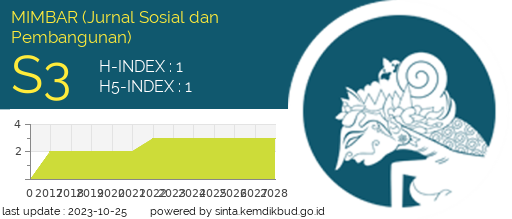Local Wisdom as a Form of Development Principles of Environmental Sustainability in Indonesia
DOI:
https://doi.org/10.29313/mimbar.v39i1.2053Keywords:
Supervision, Conservation, Fisheries, Sustainability, Nearby awarenessAbstract
Abstract. This research is important to obtain the concept of developing the Principles of Environmental Sustainability in Indonesia, in order to preserve the marine environment againts various forms ofviolations in the field of marine fisheries. The Principle of Environmental Sustainability is a moral approach and emphasizes more on preventive measures in the preservation of the environment in general and in particular the marine environment. For conditions in Indonesia, there is a potential for local wisdom of the community of an area spread throughout the archipelago as a form of real efforts to involve the community in the preservation of the marine enviroment. This research was carried out using a normative juridical approach, qualitative legal analysis with legal interpretation methods, and literartur studies. The inclusion of Local Wisdom in the preservation of the marine environment is an important instrument as a form of Development of Environmental Sustainability Principles. The existence and role of local wisdom of coastal communities that are evenly distributed throughout the archipelago conceptually have the opportunity to be included as a form of the developing the Principles of Environmental Sustainability in order to support the effectiveness and efficiency of monitoring the conservation of marine fishery resources.
References
Adolf, H. (2011), Aspek-aspek Negara Negara Dalam Hukum Internasional (ke 4). Bandung: Keni Media.
Clara Tiwow, “Tinjauan Hukum Dalam Pelaksanaan Pengawasan Sumber Daya Perikanan”, Jurnal KEADILAN PROGRESIF, Volume 3 Nomor 1 Maret 2012.
Dey Ravena dan Kristian (2017), Kebijakan Kriminal (Criminal Policy), Kencana, Jakarta.
Direktur Pemantauan dan Operasi Armada KKP, “Kebijakan & Strategi Pemantauan Dan Operasi Armada Pengawasan”, Makalah Bahan Pemaparan Dalam Rapat Koordinasi Nakhoda & Perwira Kapal Pengawas, 2017.
Harris, D. . (2004). Cases and Materials on International Law. Sweet & Maxwell.
Iman Pasu Marganda Hadiarto Purba, “Penguatan Budaya Hukum Masyarakat Untuk Menghasilkan Kewarganegaraan Transformatif”, Jurnal Civics Volume 14 Nomor 2, Oktober 2017.
Julia Brannen, Memadu Metode Penelitian Kualitatif dan Kuantitatif, Pustaka Pelajar, Yogyakarta, 2004.
Juliani, “Pemanfaatan Sumberdaya Perikanan Berbasis Kearifan Lokal Di Wilayah Pesisir Kabupaten Kutai Timur“, ZIRAA’AH, Volume 40 Nomor 1, Pebruari 2015.
Muh. Sudirman Sesse, “Budaya Hukum Dan Implikasinya Terhadap Pembangunan Hukum Nasional”, Jurnal Hukum Diktum, Volume 11, Nomor 2, Juli 2013.
Otto Soemarwoto, (1997), Ekologi, Lingkungan Hidup dan Pembangunan, Djambatan, Jakarta.
Philippe Sands, Principles of International Environmental Law, Cambridge University Press, United States of America, Newyork, 2012.
Romli Atmasasmita, “Tiga Paradigma Hukum Dalam Pembangunan Nasional”, Jurnal Hukum PRIORIS, Vol . 3 No. I, Tahun 2012.
Samsul Wahidin, Dimensi Hukum Perikanan Dalam Perspektif Lingkungan Hidup, Pustaka Pelajar, Yogyakarta, 2019.
Schhrecker, T.F., Political Economy of Environmental Hazards, Law Reform Commission of Canada, Ottawa, 1985.
Silalahi, D. (2001). Metodologi Penelitian Hukum-Preferensi Khusus Pada Pendekatan Multi/Interdisipliner. Bandung: Lawencon Copy & Binding Centre.
Soerjo Soekamto (1983), Faktor-faktor yang Memengaruhi Penegakan Hukum, Rajawali, Jakarta.
Soerjono Soekanto, Pengantar Penelitian Hukum, UI-Press, Jakarta, 1986.
Sodik, D. M. (2011). Hukum Laut Internasional, dan Pengaturannya di Indonesia. Refika Aditama.
Steers, Ungson, Mowday, Managing Effective Organization, An Introduction, Kent Publishing Company, Boston, Masschusetts, 1985.
Trian Yunanda (Direktur Pengelolaan Sumber Daya Ikan KKP), “Arah Kebijakan Pengelolaan Sumber Daya Ikan Tahun 2020-2024”, Makalah disampaikan pada Upgrading Observer on Board TA 2020, Direktorat Pengelolaan Sumber Daya Ikan, Ditjen Perikanan Tangkap KKP,2020.
Downloads
Published
Issue
Section
License
Copyright (c) 2023 MIMBAR : Jurnal Sosial dan Pembangunan

This work is licensed under a Creative Commons Attribution-NonCommercial-ShareAlike 4.0 International License.














